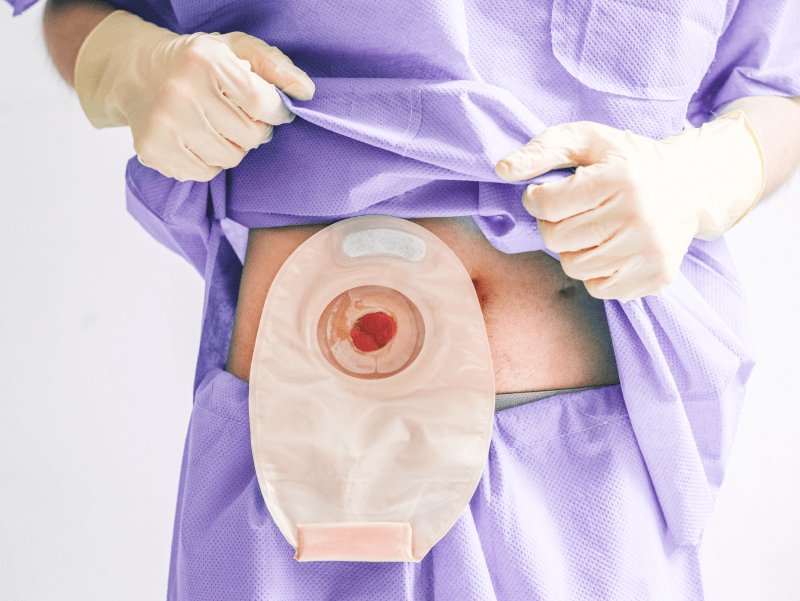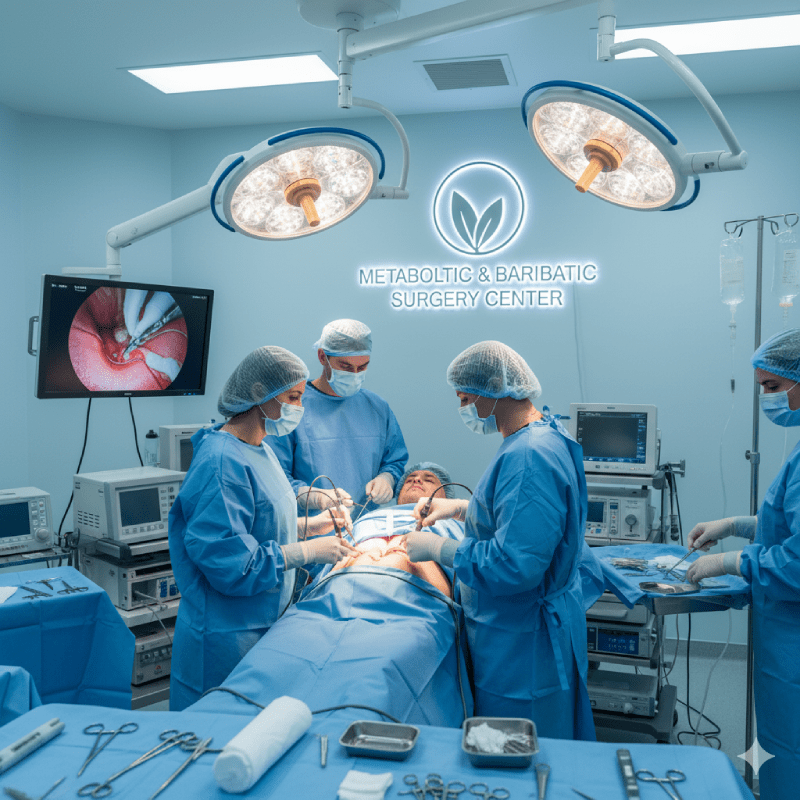What Is Mini Gastric Bypass Surgery And How Is It Performed?
Mini Gastric Bypass (MGB) is a bariatric surgical procedure that promotes weight loss by both reducing the stomach volume and bypassing a portion of the small intestine from food absorption. This procedure is performed laparoscopically (keyhole surgery), creating a long, narrow pouch from the stomach.
Approximately 150-200 cm of the small intestine is then connected to this new stomach pouch. Thanks to this dual mechanism, the patient can consume less food while a part of the consumed nutrients is passed through without being fully absorbed by the body. MGB is technically simpler than the classic Gastric Bypass and the operation time is usually shorter, contributing to quicker recovery.
Who Is Mini Gastric Bypass Surgery Suitable For?
Mini Gastric Bypass surgery is generally suitable for patients with a Body Mass Index (BMI) of 40 and above, or those with a BMI between 35 and 40 who suffer from serious obesity-related health issues such as Type 2 diabetes, high blood pressure, or sleep apnea. Candidates must also have been unsuccessful in achieving permanent weight loss through conventional methods like diet and exercise and must be committed to adopting lifestyle changes after the surgery. A detailed evaluation by a multidisciplinary board consisting of endocrinologists, psychiatrists, and dieticians is mandatory before the operation can be approved.
What Are The Starting Prices For Mini Gastric Bypass In Marmaris?
Mini Gastric Bypass prices in Marmaris, like in other popular health tourism destinations in Turkey, are considerably more economical compared to equivalent quality surgical procedures in Western Europe and the United States. Prices are personalized and vary depending on the hospital’s technological equipment, the scope of the operation, and the patient’s general health status. While starting prices for a standard MGB surgery are competitive, they may increase due to revision surgery or additional medical conditions (such as hernia repair). By contacting Cure Holiday, you can receive all-inclusive package price quotes that cover surgery, accommodation, and transfers, offering transparent cost planning from the start.
What Are The Advantages Of Mini Gastric Bypass Surgery?
One of the most significant advantages of Mini Gastric Bypass surgery is that it is technically simpler than the classic Roux-en-Y Gastric Bypass, requiring only one anastomosis (connection). This reduces the operation time and minimizes the risk of certain complications. Furthermore, MGB achieves rapid and long-term sustained weight loss, making it highly effective. It is also particularly effective in the treatment of obesity-related diseases such as Type 2 diabetes, hypertension, and high cholesterol. The rapid recovery process is another key benefit, which shortens the required stay for patients in Marmaris.
Are There Any Disadvantages Of Mini Gastric Bypass Surgery?
Like all surgical procedures, Mini Gastric Bypass carries certain disadvantages. The primary concern is the potentially higher risk of reflux (stomach acid and bile flowing back into the esophagus) compared to the classic Gastric Bypass. Additionally, due to malabsorption (impaired nutrient absorption), lifelong vitamin and mineral supplementation is mandatory; deficiencies in B12, iron, and calcium are particularly common. Although rare, situations requiring revision, such as dissatisfaction with the size of the stomach pouch or the small intestine connection point, may occur in the long term.
What Is The Success Rate And Expected Weight Loss From The Surgery?
The success rate of Mini Gastric Bypass surgery is quite high. Patients are expected to lose an average of 60% to 80% of their excess weight within the first 18 to 24 months following the surgery. Success is directly related not only to the surgical technique but also to how strictly the patient adheres to the post-surgery diet and lifestyle changes. The surgery is merely a tool; for sustainable success, it is critical for the patient to attend regular follow-ups, adopt healthy eating habits, and integrate physical activity into their life permanently.
What Should The Post-Surgery Diet Plan Be Like?
The post-surgery diet plan requires a rigid, four-stage protocol to allow the stomach pouch to heal and to maintain weight loss. The first few weeks involve only clear fluids and a full liquid diet. This is followed by pureed soft foods. After approximately one month, patients transition to small portions of normal solid foods, which must be chewed slowly and thoroughly. Adequate protein intake, vitamin supplements, and high water consumption are the foundations of this process. Dietician follow-up is mandatory to prevent nutritional deficiencies and establish healthy habits for the long run.
How Long Does Mini Gastric Bypass Surgery Take?
Mini Gastric Bypass surgery, performed laparoscopically (minimally invasive technique), generally takes between 60 to 90 minutes. This duration may slightly vary depending on the surgeon’s experience, the patient’s anatomical structure, and any potential additional challenges encountered during the operation (such as excessive abdominal fat or scar tissue). The short duration of the surgery reduces the time spent under general anesthesia, thereby lowering the risk for the patient and contributing to a faster recovery process overall.

Why Is Choosing Marmaris For The Surgery Advantageous?
Choosing Marmaris for Mini Gastric Bypass offers a blend of advantages, combining treatment with recovery. The facilities in Marmaris are modern, technologically advanced hospitals that provide services at international standards. Besides the price advantage prevalent across Turkey, patients have the opportunity to spend their post-operative recovery period in the peaceful and relaxing tourism environment where the Aegean and Mediterranean meet. This contributes positively to psychological recovery and motivation. Cure Holiday handles all medical and logistical coordination throughout this entire process.
How Many Days Of Hospital Stay Are Required After The Surgery?
Since Mini Gastric Bypass surgery is performed laparoscopically, the length of the hospital stay is much shorter compared to traditional open surgery. The vast majority of patients typically stay in the hospitals in Marmaris for three to four nights after the operation to complete the initial observation and adaptation to the liquid diet phase. During this period, pain control is ensured, patients are monitored for potential complications, and detailed instructions are provided by the dietician and surgeon before discharge.
Are Accommodation And Transfer Services Included In The Treatment Package?
Mini Gastric Bypass treatment packages for international patients generally include the surgery, hospital stay, airport transfers, and hotel accommodation in Marmaris for a specified period. These comprehensive services are designed to ensure that patients can focus solely on their health from the moment they arrive in Marmaris. Packages you receive through Cure Holiday usually cover all these logistical details, eliminating the need for international patients to worry about travel or accommodation arrangements. You can contact us for immediate information to clarify the full content of your specific package.
What Tests And Evaluations Are Performed Before The Surgery?
Before MGB surgery, a comprehensive battery of medical evaluations is conducted to determine the patient’s suitability for the procedure. These include a complete blood count, biochemistry tests, liver and kidney function tests, thyroid panel, vitamin and mineral levels, an ECG to check heart health, and a chest X-ray. Additionally, an endoscopy is mandatory to examine the condition of the stomach and duodenum. Psychological evaluation is critical to ensure the patient is prepared for the necessary post-surgery lifestyle changes and commitment required for long-term success.
What Are The Possible Complications After The Surgery?
Possible complications after Mini Gastric Bypass surgery exist, as with any surgical procedure. Early complications include the rare risk of anastomotic leak (leakage), bleeding, or infection at the surgical site. Long-term issues may include ulcer formation, hernia development, chronic diarrhea, and especially problems related to vitamin and mineral deficiencies (anemia, bone loss). Vitamin deficiencies, the most common long-term problem, can be completely prevented with lifelong regular supplement use, closely monitored by annual blood tests.
How Long Does The Post-Surgery Recovery Process Take?
The recovery process after Mini Gastric Bypass surgery is generally quick. Patients begin walking within 24 hours after the operation and are discharged within three to four days. Resumption of light daily activities and work usually takes one to two weeks. However, full recovery and return to heavy physical activity (heavy lifting, intense sports) is recommended to be deferred for four to six weeks. Strictly adhering to the surgeon’s and dietician’s instructions during the recovery period is critical for a successful outcome and minimizing risks.
Does Mini Gastric Bypass Permanently Solve My Weight Problem?
Mini Gastric Bypass is a permanent tool with a high success rate in resolving the patient’s weight problem, but it is not a standalone solution. The reduction in stomach size and decrease in nutrient absorption provided by the surgery are the primary triggers. However, long-term success (5 years and beyond) depends on the patient’s permanent commitment to changing their lifestyle, eating habits, and level of physical activity. Continuous medical and nutritional follow-ups are essential throughout life for sustaining successful results and managing potential challenges effectively.
Is Weight Regain Possible After The Surgery?
Yes, weight regain after Mini Gastric Bypass surgery is possible, although it is relatively rare. The most common cause of weight regain is the patient’s failure to adhere to post-surgery dietary and exercise guidelines. Specifically, the excessive consumption of high-calorie, liquid, or soft foods (such as ice cream, milkshakes, sweet coffees, or chips) can increase calorie intake without requiring the stomach pouch to stretch over time. Utilizing the regular psychological and dietary follow-up services provided by the surgical team and Cure Holiday is crucial to prevent weight regain.
Is Smoking And Alcohol Consumption Forbidden Before The Surgery?
Smoking and alcohol consumption are strictly forbidden before Mini Gastric Bypass surgery because they adversely affect surgical risks and the healing process. Smoking increases the risk of anesthesia and post-surgery pulmonary complications while severely slowing down wound healing. Alcohol can affect the liver and lead to clotting problems, increasing the risk of bleeding. Surgeons require patients to completely cease these habits at least four to six weeks before the operation to ensure a healthy and safe surgical outcome.
What Is The Effect Of Mini Gastric Bypass On Type 2 Diabetes?
The effect of Mini Gastric Bypass on Type 2 diabetes can be quite rapid and dramatic. Shortly after the surgery, even before the patient loses a significant amount of weight, the hormonal changes in the small intestine lead to a reduction in insulin resistance. This enables a large portion of patients (approximately 80-90%) to completely discontinue their diabetes medications or significantly reduce their dosages. MGB is recognized as one of the most effective surgical methods for achieving diabetes remission and improving long-term metabolic health.

Are Vitamin And Mineral Supplements Compulsory After Surgery?
Due to the intentional reduction in nutrient absorption (malabsorption) after Mini Gastric Bypass, taking vitamin and mineral supplements lifelong is absolutely mandatory. The small size of the stomach pouch and the bypass of a section of the small intestine prevent the body from adequately absorbing essential nutrients like iron, Vitamin B12, calcium, and Vitamin D. Regular use of these supplements is vital to prevent serious health issues such as anemia, bone loss, and neurological damage, and this is strictly monitored with annual blood tests.
What Is The Difference Between Laparoscopic And Open Surgery?
Mini Gastric Bypass is almost always performed using the laparoscopic (minimally invasive, keyhole) method in modern Marmaris hospitals. In laparoscopic surgery, only a few small incisions are made in the abdomen, and the operation is conducted using a camera and specialized thin instruments. Open surgery, conversely, involves a large incision. The advantages of the laparoscopic approach include a shorter hospital stay, less pain, faster recovery, and smaller, more aesthetic scars compared to open surgery. Open surgery is reserved only for very rare, highly complex cases.
Is Hair Loss Experienced After The Surgery?
Yes, temporary hair loss is a very common occurrence after Mini Gastric Bypass surgery, particularly between the third and sixth months. This is a physiological response of the body to rapid weight loss, the stress of the surgery, and a temporary drop in the absorption of nutrients like protein, biotin, and zinc during the initial months. This hair loss is generally temporary and begins to slow down after the sixth month. Ensuring adequate protein intake and consistent use of multivitamin supplements after surgery helps to minimize this condition.
When Should Physical Activity Be Resumed After The Surgery?
Walking and moving around within the first 24 hours after the surgery is strongly encouraged to prevent the risk of thrombosis (blood clots) and to stimulate bowel movement. Light-paced walking can be continued after discharge. However, activities that strain the abdominal muscles, heavy lifting, or intense sports should be avoided for at least four to six weeks after the operation. This period is necessary for the incisions to heal completely and to minimize the risk of developing a hernia at the surgical sites.
Does Skin Sagging Occur After Mini Gastric Bypass Surgery?
Due to the rapid and substantial amount of weight loss experienced after Mini Gastric Bypass surgery, skin sagging is commonly observed, particularly in the abdomen, arms, legs, and chest areas. The degree of sagging depends on the patient’s age, genetics, skin elasticity, and the total amount of weight lost. Sagging can be aesthetically distressing for some patients, and in such cases, body contouring surgeries (such as abdominoplasty or arm lift) may be required after the weight loss has stabilized (typically around 12-18 months post-op).
How Is The Long-Term Follow-Up Of The Surgery Performed?
Long-term follow-up after Mini Gastric Bypass surgery is vital for maintaining success and preventing potential nutritional deficiencies. Follow-up appointments are generally more frequent in the first year after surgery (at 3, 6, 9, and 12 months). From the second year onwards, follow-up should be conducted at least once a year. These checks monitor weight status, blood tests (vitamin and mineral levels), dietician evaluation, and psychological well-being. Cure Holiday will assist you in organizing this crucial long-term follow-up process effectively.
Are The Hospitals In Marmaris Internationally Accredited?
Since Marmaris is a significant center for health tourism, many of the modern private hospitals providing services are internationally accredited and operate at European standards (such as ISO, JCI). These accreditations confirm that the hospital meets specific global standards regarding hygiene, safety, and the quality of care provided. By choosing Marmaris, you have the opportunity to receive high-quality healthcare at an affordable cost and under international assurance. Cure Holiday works exclusively with facilities that adhere to these high standards.
Does Reflux Problem Occur After The Surgery?
Due to the surgical anatomy, Mini Gastric Bypass carries the potential for stomach contents (including bile) to flow back into the esophagus, which can lead to reflux. The risk of reflux is slightly higher in MGB compared to the classic Gastric Bypass. However, surgeons use specific techniques to minimize this risk. For patients who already have existing reflux complaints, the surgeon may plan pre- and post-operative medication or recommend a different bariatric surgical method that is more suitable for the patient’s anatomy.
Is It Safe To Get Pregnant After The Surgery?
It is generally safe to get pregnant after Mini Gastric Bypass surgery, but it is strongly advised to wait at least 12 to 18 months before conception. This waiting period is necessary for the mother’s body to adapt to the rapid weight loss and nutritional changes following the surgery. Early pregnancy carries the risk of nutritional deficiencies for both the mother and the baby. When pregnancy is planned, close monitoring by a gynecologist, bariatric surgeon, and dietician, and adjustment of vitamin/mineral supplements, is critically important.
What Do The Price Quotes Include?
The comprehensive price quotes you receive for Mini Gastric Bypass surgery in Marmaris through Cure Holiday typically include the surgical fee (surgeon and team), hospital fees (operating room, anesthesia, medications, and hospital stay), necessary pre-operative tests (blood tests, ECG, endoscopy), and consultations with the dietician and physiotherapist. Furthermore, logistical services for international patients, such as airport transfers and high-standard hotel accommodation for the determined duration in Marmaris, are also included in these all-inclusive packages.
What Is The Process If Revision Surgery Is Required?
If revision is needed after Mini Gastric Bypass surgery due to insufficient weight loss, excessive weight regain, or serious complications (such as severe reflux), the process is meticulously evaluated by specialists in Marmaris. Revision surgery typically involves converting the MGB to a classic Gastric Bypass (Roux-en-Y) or readjusting the stomach pouch and connections. Revision surgery can be more complex and riskier than the initial operation and will incur a separate cost. Cure Holiday will be by your side throughout this process to offer the safest and most suitable solution.
How Should A Travel Plan To Marmaris Be Made?
When planning your travel to Marmaris for Mini Gastric Bypass surgery, you should generally arrange your flights through Dalaman Airport (DLM), the closest international airport. Cure Holiday will organize your airport pickup and transfer to Marmaris (approximately 1.5 hours). A travel plan should encompass the treatment, hospital stay, and the required recovery period in Marmaris (totaling approximately 7-10 days). All travel documents, accommodation, and hospital appointments will be pre-arranged by us for a smooth experience.

How Is Pain Control Managed After The Surgery?
Since Mini Gastric Bypass is performed laparoscopically, the level of post-operative pain is lower than open surgery and is generally easily manageable. During your hospital stay (the first 3-4 days), pain control is meticulously provided with intravenous (IV) and oral pain relievers. Upon discharge, effective oral pain medication is prescribed for the patient’s use at home. Patients typically report that the need for pain medication significantly decreases within one week, ensuring a comfortable recovery process in Marmaris.
Is Dumping Syndrome Experienced After Mini Gastric Bypass?
Yes, Dumping Syndrome (rapid gastric emptying) can be experienced after Mini Gastric Bypass. This syndrome occurs when high-sugar or high-fat foods rapidly pass into the small intestine, leading to uncomfortable symptoms such as palpitations, sweating, abdominal cramps, diarrhea, and dizziness. Dumping Syndrome is seen less as a complication and more as a protective mechanism that discourages the patient from consuming unhealthy foods. Experiencing these symptoms strongly reminds the patient to adhere to the strict dietary rules.
Is There A Requirement To Lose Weight Before The Surgery?
Before Mini Gastric Bypass surgery, a pre-operative weight loss (pre-op diet) program is usually requested by surgeons to ensure the patient enters the surgery more safely and to reduce the size of the liver. This diet is typically a high-protein, low-carbohydrate liquid diet, started two to four weeks before the operation. Pre-operative weight loss shrinks the liver, improving the surgeon’s field of view and significantly reducing the technical difficulty and complication risk of the surgery itself.
Is Mini Gastric Bypass A Reversible Procedure?
Mini Gastric Bypass is technically a reversible procedure, although this is rarely performed. The reversal operation is usually only considered in cases of severe, life-threatening complications or persistent nutritional deficiencies. This revision surgery involves returning the anatomy to its original state or converting it to a classic Roux-en-Y Gastric Bypass. Although its reversibility offers reassurance, the vast majority of patients do not pursue this option as they are satisfied with their long-term weight loss results.
How Can I Reach Experienced Surgeons In Marmaris?
The experience level and areas of expertise of our Mini Gastric Bypass surgeons serving in Marmaris are carefully vetted through our partner hospitals in Marmaris. We collaborate with surgeons who are highly specialized, internationally experienced in bariatric surgery, and have achieved high patient satisfaction rates. To reach these specialists and organize your initial consultation, you can directly contact Cure Holiday. We will provide you with detailed information including our surgeons’ CVs and success metrics to help you make an informed decision.
When Can You Return To Your Country For Post-Surgery Follow-Up?
After staying in the hospital in Marmaris for 3-4 days following the Mini Gastric Bypass surgery, patients are advised to remain in Marmaris for a total of approximately 7 to 10 days for their first post-discharge follow-up and check-ups. During this time, wound healing is monitored, bandages are removed, and the surgeon performs final controls. Your long-term follow-up after returning to your home country will be maintained through online consultations and collaboration with doctors in your local area. Cure Holiday will assist you in coordinating this international follow-up process.
Is Psychological Support Necessary After The Surgery?
Psychological support after Mini Gastric Bypass surgery is as important as physical recovery and is generally considered necessary. Rapid weight loss, major changes in body image, and the complete restructuring of eating behaviors require emotional and psychological adjustments. Regular meetings with a psychologist or psychiatrist are a critical support mechanism for patients struggling with eating dependencies, mood changes, or difficulties adapting to their new lifestyle, ensuring long-term weight management success.
What Is The Difference Between Mini Gastric Bypass And Sleeve Gastrectomy?
The main difference between Mini Gastric Bypass (MGB) and Sleeve Gastrectomy (Vertical Sleeve Gastrectomy) is the malabsorptive (reduced absorption) component. Sleeve Gastrectomy only restricts stomach volume (by about 80%), whereas MGB both restricts the stomach volume and reduces nutrient absorption by bypassing a section of the small intestine. For this reason, MGB is generally considered more potent in resolving Type 2 diabetes. While Sleeve Gastrectomy is irreversible, MGB is theoretically a reversible procedure. Your surgeon will determine which method is most suitable for your specific needs.
What Medications Are Used After Mini Gastric Bypass?
After Mini Gastric Bypass surgery, patients must regularly use certain medications and supplements. These include stomach protection medications (Proton Pump Inhibitors) generally used for the first few months to protect the stomach pouch and the anastomosis line, and, critically, high-dose multivitamins, Vitamin B12, Iron, and Calcium/Vitamin D supplements which must be taken lifelong. Prescription medications for pain and nausea are also provided for short-term use. Your surgeon will clearly specify your entire medication list and usage instructions before you leave Marmaris.



